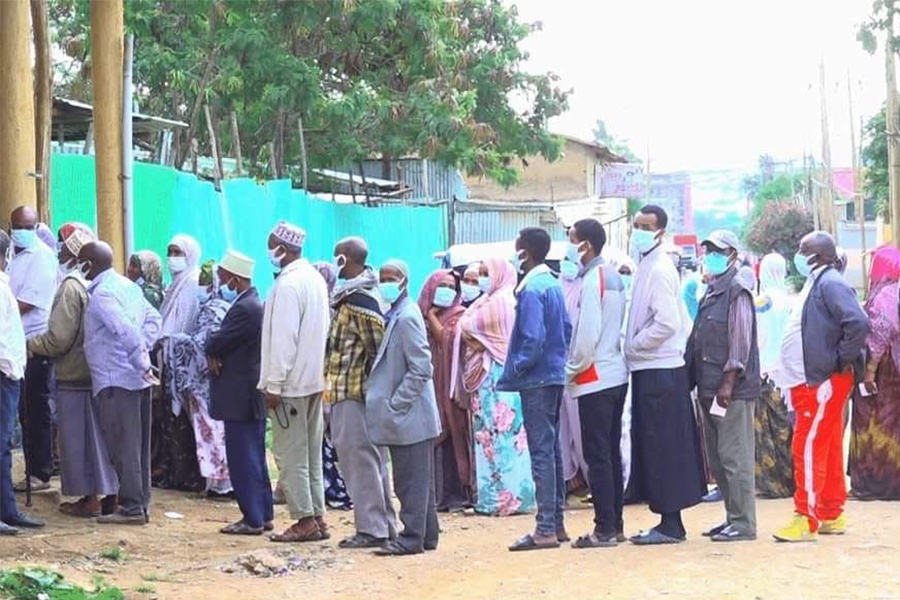
Radar | Jul 23,2022
Jan 7 , 2023
By Yergalem Taages
Unsafe food consumption poses a high risk of health threats. Facilitating a smooth functional agri-food system that underpins economic development is vital to maintaining its nutritional security. The impact and challenges of Aflatoxin cannot better exemplify the interplay of food security and safety.
Aflatoxins are naturally occurring toxins from a specific fungus referred to as Aspergillus flavus and Aspergillus parasiticus. It contaminates many African dietary staples such as maize, groundnuts, rice, and cassava. If the feed is laced with the toxin, animals would then be highly affected and transmit the fatal poison through their products to human beings.
Apart from the climatic conditions, poor agricultural and post-harvest management practices favour the growth and proliferation of the aflatoxin-producing Aspergillus in Africa. Its contamination can occur throughout value chains, making target interventions challenging. Pre-harvest occurrence of Aflatoxin increases when crops are subjected to stress factors such as drought and attacks from pests.
Given the link between its adverse human health impact that poses a clear food security threat, contamination after harvest spikes with poor drying, storage, and handling. The problem with the toxin is so complex that it straddles agriculture, trade, and public health sectors.
The range of contamination affects the agricultural sector output from the four pillars of food security: availability, access, utilisation, and stability. Contamination in staples can directly reduce the availability of food. Producers may also earn less because of product rejection and the inability to access higher-value international trade. Aflatoxin contamination can result in a direct economic impact through export rejection from importers with stringent regulations, such as the European Union (EU) countries. Between 2007 and 2012, the EU issued 346 notifications to African countries regarding the issue.
Aflatoxin contamination of maize, groundnuts, and sorghum occurs above safe levels in African countries, with estimated contamination of the toxin in staple foods as high as 60pc, especially in the East African Community.
The toxin's negative economic effect in Africa can be better explained by its impact on the export of groundnuts. Africa could earn up to one billion dollars annually from groundnut exports by regaining a 77pc share of the global export market instead of the current four percent share, valued at 64 million dollars.
The health and nutritional impacts are enormous. The best-documented health impact of chronic exposure to the toxin is related to liver cancer. According to the African Union's Partnership for Aflatoxin Control in Africa programme, it alone is responsible for 30pc of liver cancer cases globally, with the highest incidence, more than 40pc, occurring in Africa. Estimated 26,000 Africans living south of the Sahara die annually of liver cancer associated with the exposure.
The complex challenge of dealing with risks to foods susceptible to aflatoxin contamination needs everyone's involvement – from farm to fork. All have to play a part under Africa-wide policies and regulations that apply international food safety standards. Building a chain of laboratories across Africa to track compliance with such standards will safeguard African consumers and open markets close to African farmers, traders and food industries.
Good agricultural practices are essential to address production-related aflatoxin problems at the planting and harvesting stage. It is also critical to consider good post-harvest practices, including proper storage, transport, and processing, as this is a particularly vulnerable point for contamination of human and animal food. Awareness raising is crucial to increase demand for aflatoxin-safe products and incentivise the adoption of its control strategies along the value chain.
Equally important is raising awareness to raise consumer demand for safe, high-quality food. It is also crucial to address information gaps through urgent research, including the prevalence of Aflatoxin and its health and economic impact in East African countries, to provide evidence and trigger informed decision-making and policy actions.
A controlling programme with effective policies and regulations, food safety standard development, and enforcement measures are required. Actions are needed at all levels - continental, national, subnational, and local- to reduce Africa's Aflatoxin prevalence and exposure.
PUBLISHED ON
Jan 07,2023 [ VOL
23 , NO
1184]


Radar | Jul 23,2022

Radar | Sep 19,2020

Agenda | Aug 05,2023

Fortune News | Sep 30,2021

Fortune News | Nov 13,2021

Fortune News | Jun 07,2020

Editorial | Mar 18,2023

Radar | May 11,2019

Fortune News | Aug 16,2020

Fortune News | Oct 12,2019

Photo Gallery | 175003 Views | May 06,2019

Photo Gallery | 165229 Views | Apr 26,2019

Photo Gallery | 155503 Views | Oct 06,2021

My Opinion | 136760 Views | Aug 14,2021

Dec 22 , 2024 . By TIZITA SHEWAFERAW
Charged with transforming colossal state-owned enterprises into modern and competitiv...

Aug 18 , 2024 . By AKSAH ITALO
Although predictable Yonas Zerihun's job in the ride-hailing service is not immune to...

Jul 28 , 2024 . By TIZITA SHEWAFERAW
Unhabitual, perhaps too many, Samuel Gebreyohannes, 38, used to occasionally enjoy a couple of beers at breakfast. However, he recently swit...

Jul 13 , 2024 . By AKSAH ITALO
Investors who rely on tractors, trucks, and field vehicles for commuting, transporting commodities, and f...

Oct 18 , 2025
The political establishment, notably the ruling party and its top brass, has become p...

Oct 11 , 2025
Ladislas Farago, a roving Associated Press (AP) correspondent, arrived in Ethiopia in...

Oct 4 , 2025
Eyob Tekalegn (PhD) had been in the Governor's chair for only weeks when, on Septembe...

Sep 27 , 2025
Four years into an experiment with “shock therapy” in education, the national moo...

Oct 18 , 2025 . By NAHOM AYELE
In a sweeping reform that upends nearly a decade of uniform health insurance contribu...

Oct 18 , 2025 . By BEZAWIT HULUAGER
A bill that could transform the nutritional state sits in a limbo, even as the countr...

Oct 18 , 2025 . By SURAFEL MULUGETA
A long-planned directive to curb carbon emissions from fossil-fuel-powered vehicles h...

Oct 18 , 2025 . By BEZAWIT HULUAGER
Transaction advisors working with companies that hold over a quarter of a billion Bir...